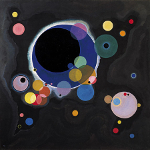Cognitive and emotional states such as stress can be measured with electroencephalography (EEG) through variations of alpha wave amplitude in prefrontal cortex. Afferent information from the viscera play a significant role in the modulation of these signals, impacting the nature and intensity of one's emotions. Gastrointestinal (GI) tract afferent interoceptive signals significantly modulate spontaneous brain activity at rest. As GI electrical rhythms change significantly under stress, their variations might be a potential candidate as a stress biomarker. Open Mind Innovation developed an immersive Virtual Reality (VR) protocol which efficiently induces stressful and relaxed states, as illustrated in blinded classification of sympathovagal markers (extracted from electrodermal activity and pulso-plethysmography - PPG recordings). Here, we propose to study the coupling between GI electrical activity - brain activity and its modulation in different levels of stress, from semi meditative, biofeedback guided state to high stress level (from cognitive overload).
By speaker > Kibleur Astrid
Gut-Brain axis: EEG-EGG coupling during stress
2 : Laboratoire Inter-universitaire de Psychologie : Personnalité, Cognition, Changement Social
(LIP-PC2S)
-
Website
Université Pierre Mendès France - Grenoble 2, Université Savoie Mont Blanc : EA4145, Université Grenoble Alpes
Université de Grenoble 2 BP 47 - 38040 GRENOBLE Cedex 9 - FRANCE / Université Savoie Mont Blanc BP 1104 - 73011 CHAMBERY - FRANCE -
France
3 : Laboratoire de psychologie et neurocognition
(LPNC)
-
Website
* : Corresponding author
CNRS : UMR5105, Université Joseph Fourier - Grenoble I, Université de Savoie
Université Pierre Mendès-France Bât Sciences de l'Homme et Mathématiques BP 47 38040 Grenoble Cedex 09 -
France
| Online user: 60 | RSS Feed |

|

 PDF version
PDF version